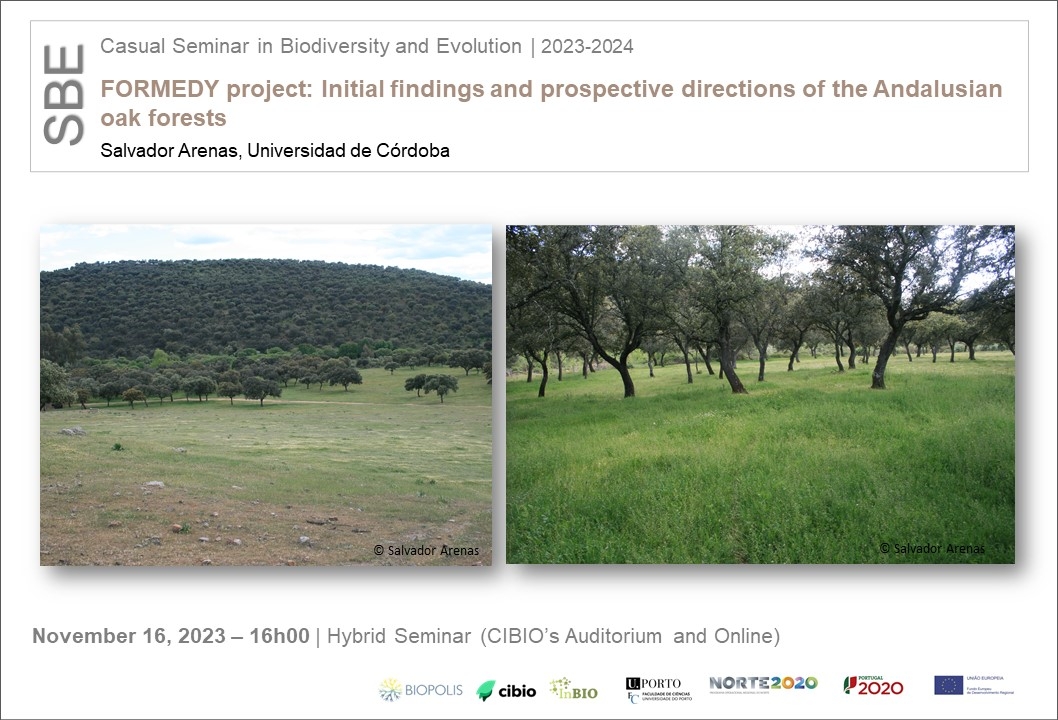FORMEDY project: Initial findings and prospective directions of the Andalusian oak forests
Event
CASUAL SEMINAR IN BIODIVERSITY AND EVOLUTION
November 16th, 2023
Salvador Arenas, Universidad de Córdoba | 16h00 | Hybrid Seminar

CASUAL SEMINAR IN BIODIVERSITY AND EVOLUTION
The Mediterranean oak (Quercus L.) forests (MOFs) occupy almost half (c. 40%) of the surface in Andalusia (Spain), being one of the plant formations with greater interest for its multifunctional nature. Despite the huge available detailed information about those more productive oak species (Quercus rotundifolia, Q. suber and Q. faginea), there is still inaccurate information about spatial and temporal patterns of the MOF distribution, functioning and dynamics, such as phenological patterns. In this sense, we establish new challenges within the FORMEDY project to respond questions such as: Are the exchange of matter and energy playing an important role in forest dynamics? How the past and current stability impacts quality and potential adaptation of MOFs to climate change? Will the new modelling-assisted frameworks based on Artificial Intelligence improve the traditional approaches towards MOF conservation and management? We hypothesised that different MOFs based on tree density (Low = dehesas, Medium = mixed and High = dense) would show different patterns in resilience and biodiversity response, and ecosystem services supply. To response to all these questions, we developed a model-assisted framework to mapping and monitoring the distributions and dynamics of MOF ecosystems in Andalusia based on Earth observation data, from structural and functional data obtained at field level by the Spanish National Forest Inventories (NFIs) plots to time series of satellite imagery data, advanced machine-learning methods such as ecological niche modelling approach, and climate change-based predictive models couple with edaphoclimatic predictors at different spatial and temporal scales.
Dr. Salvador Arenas-Castro is a dynamic and motivated ecologist with interesting in complementary research lines such as fundamental ecology, macroecology and biogeography, exploring other research sources in agroecology, ecoinformatics and remote sensing and GIS techniques. More recently, he focuses on Earth observation techniques and ecological modelling to detect changes in biodiversity patterns at different multi-scale (spatial and temporal) approaches. He obtained his PhD in ecology at the University of Cordoba (UCO; Spain), participating in many (inter-)national scientific projects with different responsibilities during the last years. Dr. Arenas-Castro is (co-)author of many peer-reviewed papers and book chapters, and combines his research activities with teaching activities, being supervisor of (inter-)national BSc, MSc and PhD students mainly at UCO, and occasionally at the University of Porto (Portugal) and the Czech University of Life Sciences (Czech Republic). Please check his webpage for further information: https://salvadorarenascastro.wordpress.com/.
[Host: Carlos Vila-Viçosa, Predicting and Managing Ecological Change - ECOCHANGE]
